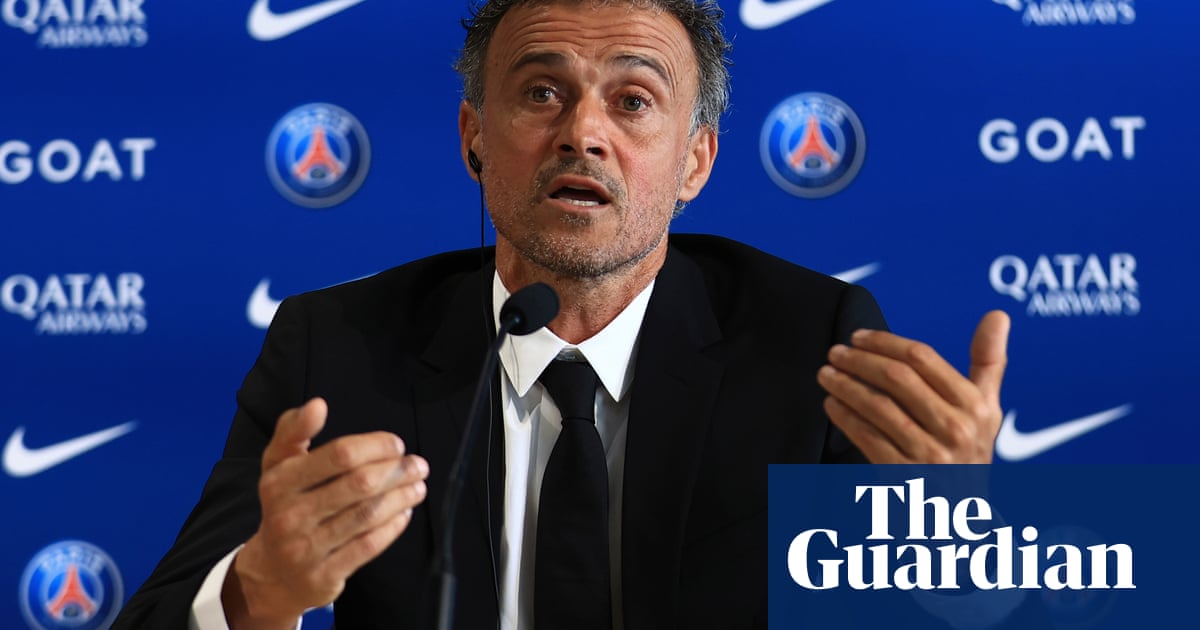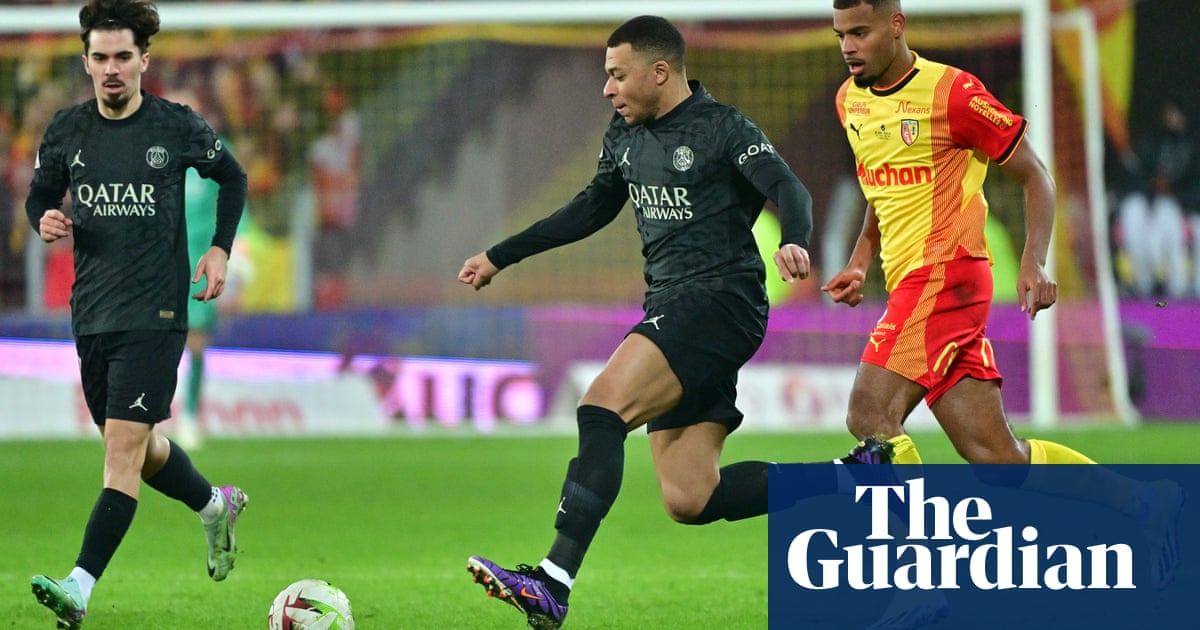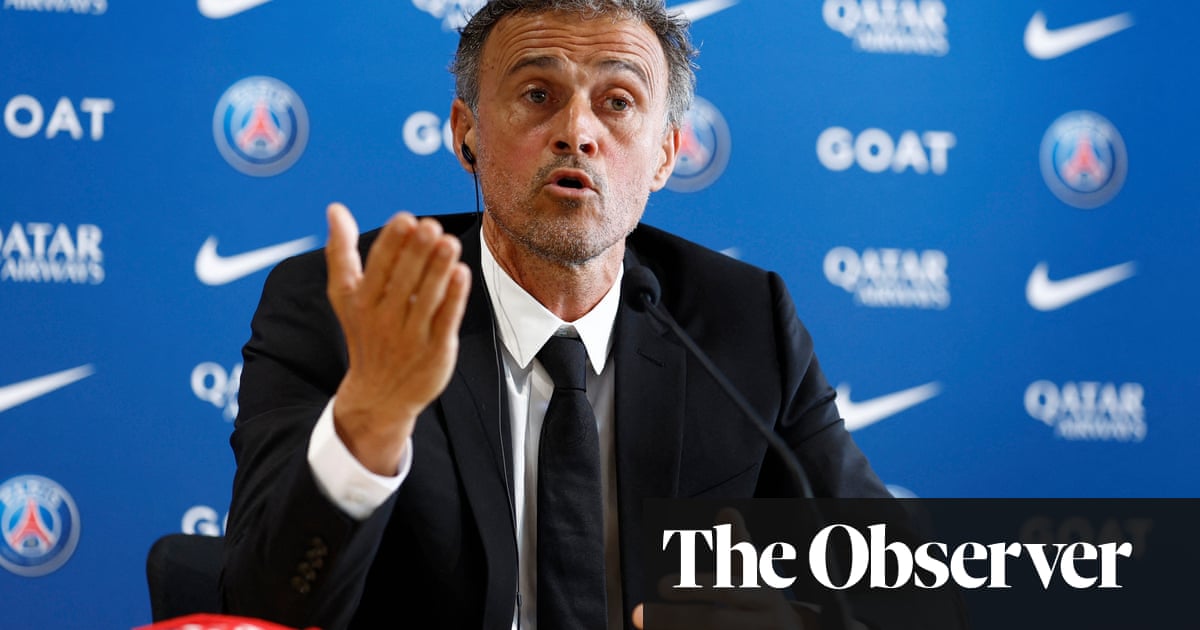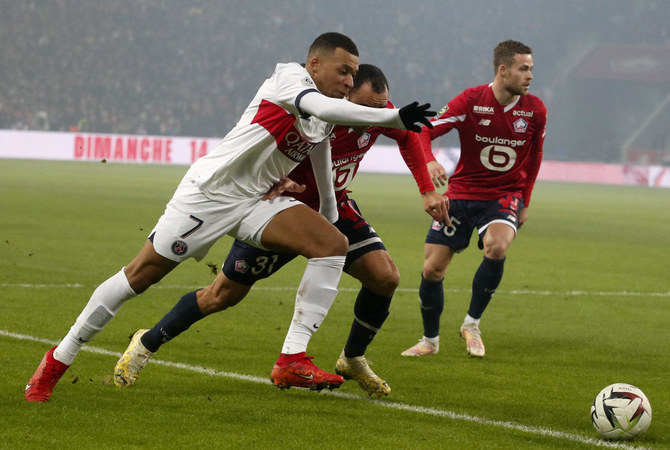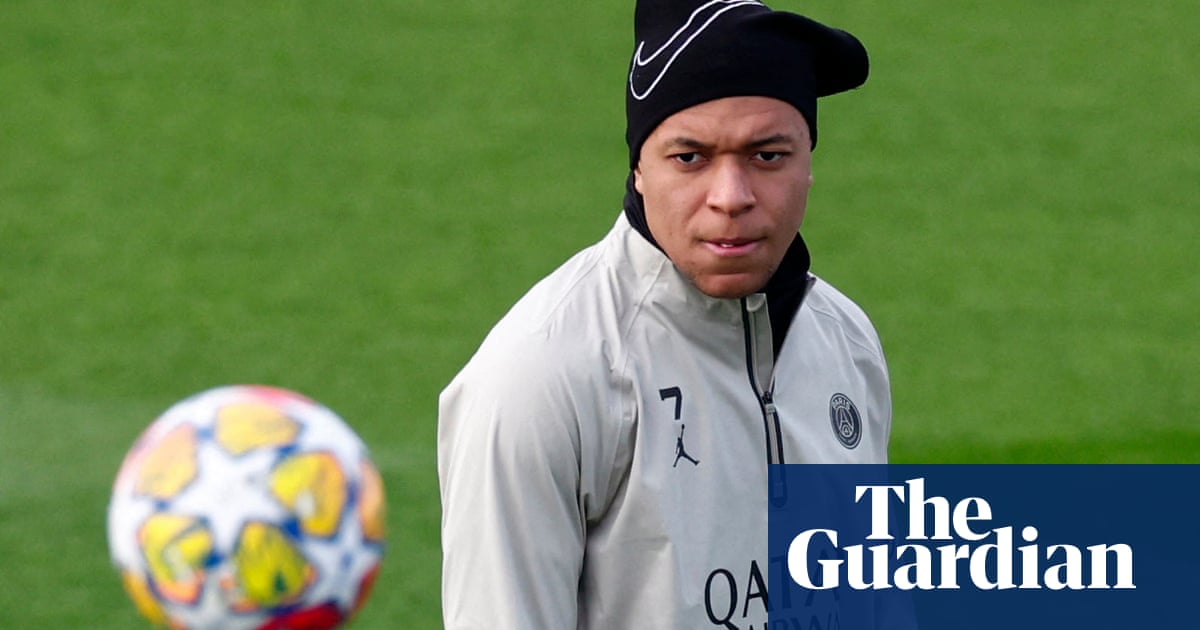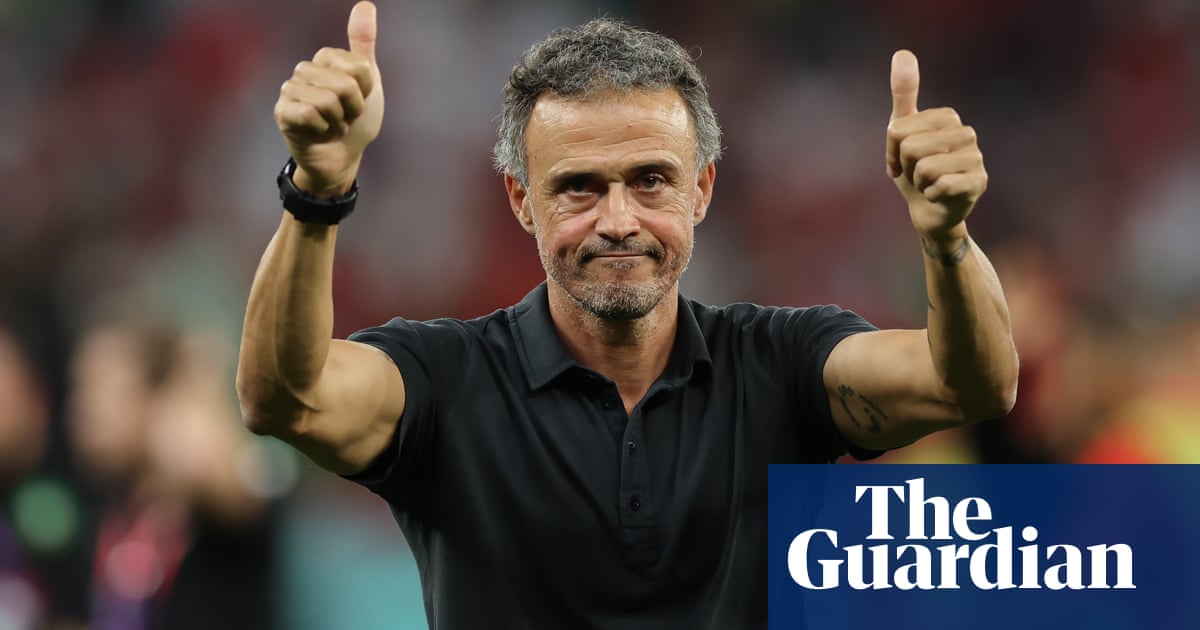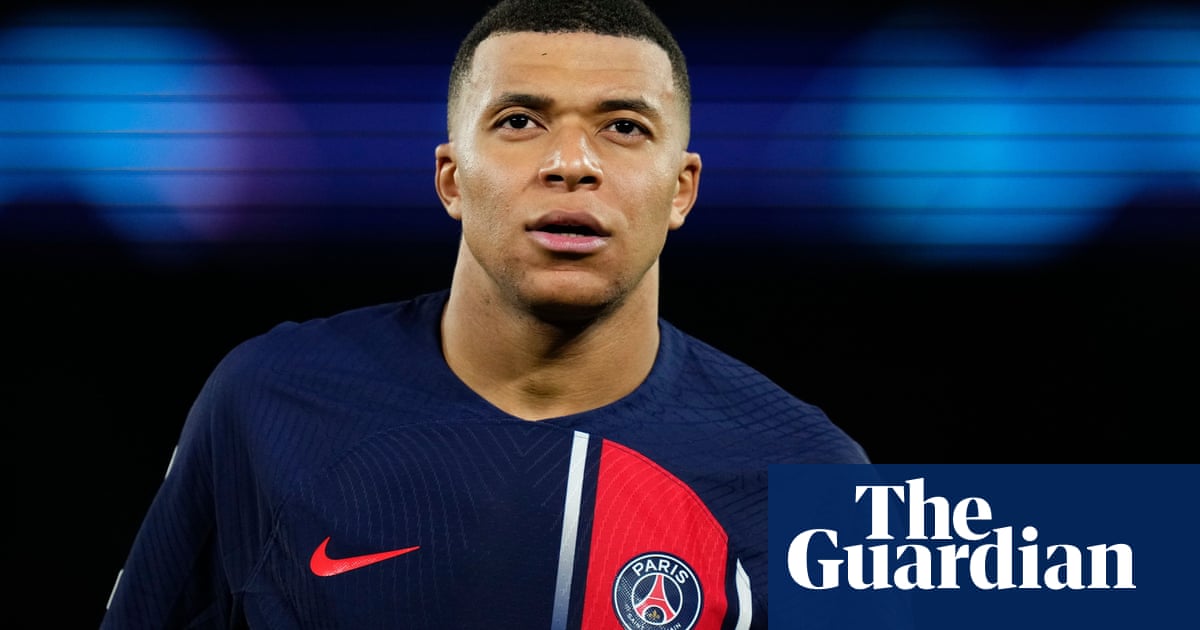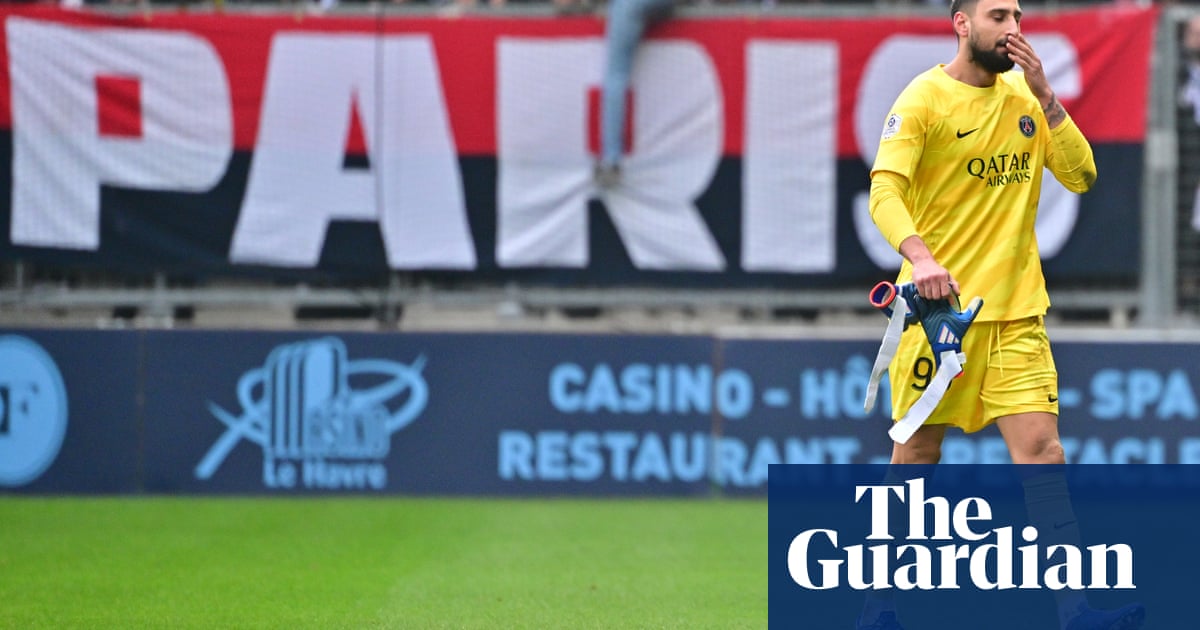
There was an air of the unfamiliar inside the Parc des Princes on Friday night. It didn’t look the same; it didn’t sound the same. The old Hexagoal Ligue 1 logo had been dispensed with, giving way to its minimalist successor, which along with the league’s new main sponsor, McDonald’s, littered the advertising boards around the stadium. Then the players entered the pitch, but not to the tune of Phil Collins’ Who Said I Would, at least not the original version.
Paris Saint-Germain, fearing a fierce backlash after having previously replaced then quickly reinstated the song amid outcry from supporters back in 2021, insisted that a modified albeit scarcely audible version of the Englishman’s track was played. But then the match began and with it, that air of familiarity swept through the terraces of the Parc as a French winger burst down the left before firing into the far corner. No, not Kylian Mbappé, but Bradley Barcola. Continuity and change.
“He represents the present and the future,” said Luis Enrique of Barcola last December. At the time, Mbappé also represented the present, but the France captain was clearly not part of the future. His acrimonious departure to Real Madrid, the consequences of which continue to be felt amid a wage dispute between the club and the striker, left a void that many assumed would be impossible to fill.
In some ways, it is like Mbappé hasn’t even left. Luis Enrique continues to be asked about the PSG forward during press conferences, and just as he did while the player was at the club, he answers – or doesn’t – with varying degrees of agitation, an agitation that increases the more Mbappé questions that are sent his way; a clear positive correlation.
However, in Mbappé’s absence, Luis Enrique perhaps unsurprisingly seems happier. Towards the end of last season, when Mbappé’s departure was assured, the Spaniard prophesied that PSG would “if everything goes well, have a better team” this term. A resounding 6-0 victory over Montpellier in Les Parisiens’ first home game of the season perhaps justifies his optimism.
“I don’t think you saw one star but 16 who came out to fight for Paris Saint-Germain’s colours: 16 stars in attack, 16 stars in defence. That is what perfection is,” said Luis Enrique in the wake of the victory. A thinly veiled dig at Mbappé, infamous for his lack of defensive work? Perhaps.
The same accusations certainly can’t be levelled at Barcola, with Luis Enrique praising the former Lyon forward’s “very good defensive work” after his double against Montpellier. His first goal came with his first touch of the match and showed that deadly turn of pace that made Mbappé such a tricky customer down the left wing. His second, PSG’s third, was a right-place, right-time goal, for which Mbappé had become renowned towards the end of his seven-year stint at the club.
But then Barcola did things that Mbappé doesn’t do, such as winning the ball deep inside his own half. One such dispossession, taking the ball from Téji Savanier, resulted in a drive to the edge of the Montpellier box and a ball into the exceptional João Neves, who teed up Marco Asensio to double PSG’s advantage midway through the first half.
By the time the hosts were 5-0 up, Barcola departed the stage, the damage already done. It was a display of ruthlessness, one so reminiscent of Mbappé that it fails to truly vanquish the memory of the Real Madrid forward, but it at least ensures that he isn’t being missed at the Parc des Princes.
Currently joint top scorer in Ligue 1 with three goals, Barcola will wear the Top Scoreur badge – one of the more pointless gimmicky initiatives from the LFP – on his sleeve next weekend. Whether he can follow in Mbappé’s footsteps and finish as top scorer is another question but perhaps an irrelevant one. Mbappé contributed to 33% of PSG’s Ligue 1 goals last season, and while Barcola may not be capable of Mbappé’s output, he may not need to be.
In PSG’s 6-2 victory over Montpellier in March, Mbappé netted a hat-trick but there was an element of chaos, a lack of control, particularly in the first half, that his absence may help to remedy. And in his absence, others are stepping up: not just Barcola, but Lee Kang-in, Asensio, and Ousmane Dembélé. As an ensemble, they are certainly capable of bridging the Mbappé deficit.
With 10 goals in two games, PSG inhabit a familiar position at the top of the tree in Ligue 1. Granted, the victories have come against two strong relegation candidates in the form of Le Havre and Montpellier, but it is already clear that, even in Mbappé’s absence, it will be difficult to knock PSG off their perch.
Talking points
In rather uncouth terms, John Textor announced Lyon’s desire to challenge the mighty PSG this season. “We hope to kick their ass,” said the American, who amid the jubilation of a dramatic rise from the relegation places to a Europa League spot in a little over three months last season, did taper that optimism. “We have to compete with Qatar in France. I am competing with a country, not an owner,” he added in an interview that did little to alleviate the tension between himself and PSG. Despite a summer of spending and having opted for stability and continuity through the appointment of miracle worker Pierre Sage as manager on a permanent basis, Lyon have failed to build on their promise. With two defeats in a row, five goals conceded, and no goals scored, that wave of optimism has evaporated.
Lyon were outclassed by Monaco, to whom there is a significant gulf in quality at present. With Marseille having dropped points this weekend, the principality club, who celebrated their 100th birthday during Saturday’s 2-0 victory, currently look best placed to challenge PSG’s stranglehold on French football.
Matching last year’s historic achievement and securing a podium finish always looked like a tall order for Brest, who, despite qualifying for the Champions League, are a considerably weaker side than the one that finished last season. A return to the so-called ventre-mou, the mid-table of Ligue 1, looked more like a probability than a possibility. Their opening performances haven’t dampened those fears of a vertiginous decline. Having conceded seven goals and scored just one, Eric Roy’s side currently sit bottom of Ligue 1. “The players need to acknowledge their current level and they all need to take a look at themselves … there are lots of players that were here last season and that are not performing at last season’s level,” said Roy. Given that those two defeats were against Marseille and Lens, there is concern but not yet a crisis. However, that would change should they not secure a result against relegation candidates Saint-Étienne this weekend.
The difference between Liam Rosenior’s and Patrick Vieira’s Strasbourg is night and day. The negative, defensive-minded approach under the latter has been replaced by a more positive, high-intensity, high-pressing style quickly established by the latter. Given Rosenior’s late appointment and the extremely youthful playing squad, the speed with which he has revolutionised Les Alsaciens’ playing style is nothing short of miraculous. An opening draw against Montpellier at the Mosson – a difficult place to go – showed signs of promise and they built on that, outmuscling Rennes 3-1, who the previous weekend had swept Lyon aside. “The secret is treating them like adults and that is what I’ve done since my arrival,” said Rosenior. He is already getting more out of Strasbourg in one month than Vieira did in a year at the helm.




